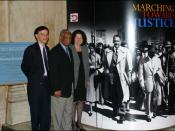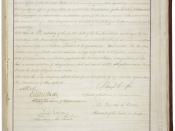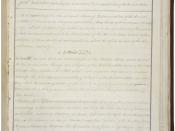Background Summary1. Homer Plessy violated the Separate Car Act. This act provides separate but equal passenger coaches for blacks and whites. Plessy, who was one eighth black, violated this law by sitting in a compartment designated for whites.
2. The Thirteenth Amendment provides that no slavery or involuntary servitude shall exist in the United States, unless as a sentenced punishment for a crime. The fourteenth amendment guarantees people born in the United States citizenship, and that all states must recognize them as citizens and grant them all rights given to citizens.
3. The Separate Car Act violates the 13th Amendment because the 13th Amendment prevents the imposition of any disabilities that constitute badges of slavery or servitude. The Separate Car Act violates the 14th Amendment because the 14th Amendment provides that no state can deprive a person of life, liberty, or property without due process of law. This Act infringes on one's personal liberty to travel in whichever car one chooses without due process of law.
4. Ferguson could legally justify his decision of the law's constitutionality in a single state but unconstitutional if the train traveled thru many states because it is a state's responsibility to decide how they handle their railroads, and that one state doesn't have the right to infringe on another state's rights.
5.Separation by race and equality are incompatible. For example, in the case of education. Separation alone implies a sense of inferiority of one race to the superiority of another. Although the physical factors may be equal in a white school and a black school, the segregation and the inequality it implies can severely damage the mind of a student.
6.An example of separation that does not mean inequality is separate bathrooms for men and women.
Majority Opinion1. The justices state...


